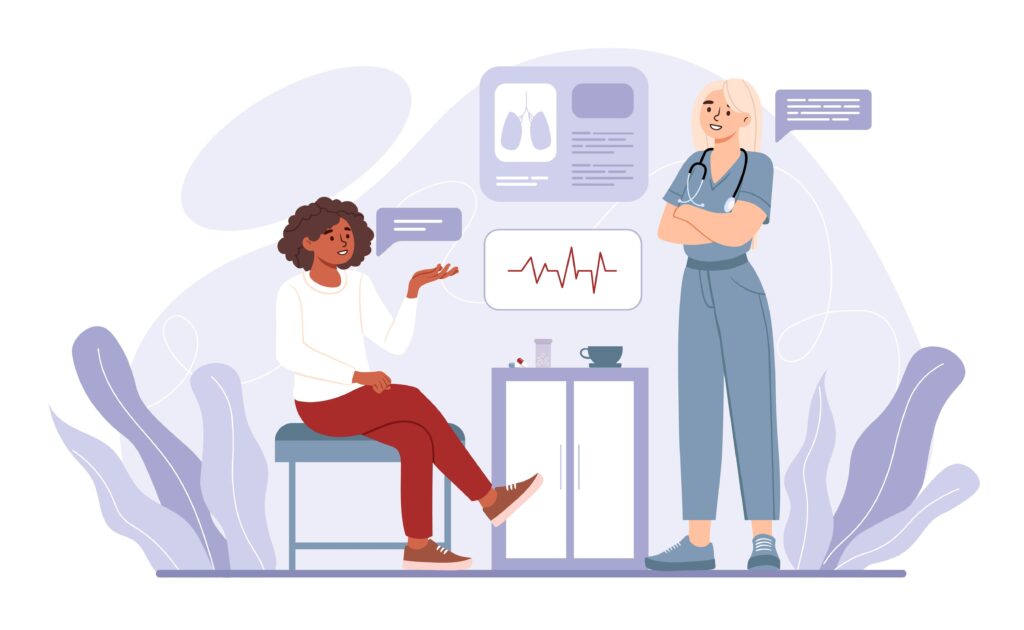Digital health solutions are revolutionizing healthcare by improving patient outcomes and streamlining care. These technologies include telemedicine, mobile health apps, wearable devices, and electronic health records (EHRs).
Telemedicine
Telemedicine allows patients to consult with healthcare providers remotely, making healthcare more accessible, especially in rural areas. It reduces the need for travel and wait times, enabling timely medical advice and follow-ups. Telemedicine can be used for a variety of purposes, including routine check-ups, medication management, and specialist consultations. For example, a patient with chronic conditions like diabetes can have regular consultations with their doctor without leaving home, ensuring continuous management and monitoring.
Mobile Health Apps
Mobile health apps help patients manage chronic conditions like diabetes and hypertension. These apps provide reminders for medication, track vital signs, and offer educational resources. For instance, a diabetes management app can help patients log their blood sugar levels, track their diet and exercise, and receive personalized feedback from healthcare providers. These apps empower patients to take an active role in their health management, improving adherence to treatment plans and overall outcomes.
Wearable Devices
Wearable devices, such as fitness trackers and smartwatches, monitor physical activity, heart rate, and sleep patterns. They provide real-time data that can be shared with healthcare providers for more personalized care. For example, a wearable device can alert a user to irregular heartbeats, prompting them to seek medical attention. Wearable devices also motivate users to stay active and maintain healthy habits.
Electronic Health Records (EHRs)
EHRs store patient information in a digital format, making it easily accessible to authorized healthcare providers. They improve the coordination of care, reduce errors, and enhance patient safety. EHRs allow healthcare providers to access a patient’s complete medical history, including previous treatments, lab results, and medications. This comprehensive view enables more informed decision-making and better continuity of care.
Remote Monitoring
Digital health solutions facilitate remote monitoring, allowing healthcare providers to keep track of patients’ health in real-time and intervene when necessary. For example, patients with chronic heart failure can use remote monitoring devices to transmit their vital signs to their healthcare provider. If any abnormalities are detected, the healthcare provider can adjust the treatment plan or recommend immediate action, potentially preventing hospitalizations and improving patient outcomes.
Benefits of Digital Health Solutions
- Improved Access to Care: Digital health solutions bridge the gap between patients and healthcare providers, making it easier for individuals in remote or underserved areas to receive quality care. Telemedicine, for example, allows patients to consult with specialists who may not be available locally.
- Enhanced Patient Engagement: Mobile health apps and wearable devices empower patients to take an active role in their health management. By providing tools for self-monitoring and access to educational resources, these technologies encourage patients to adhere to treatment plans and make informed decisions about their health.
- Cost Savings: Digital health solutions can reduce healthcare costs by minimizing the need for in-person visits, hospitalizations, and emergency room visits. Remote monitoring and telemedicine can help manage chronic conditions more effectively, preventing complications and reducing overall healthcare expenses.
- Improved Health Outcomes: By enabling continuous monitoring and timely interventions, digital health solutions can improve health outcomes for patients with chronic conditions. For instance, regular remote monitoring of blood pressure can help control hypertension more effectively, reducing the risk of heart disease and stroke.
- Increased Efficiency: EHRs and other digital tools streamline administrative processes, reducing paperwork and freeing up time for healthcare providers to focus on patient care. Improved communication and coordination among healthcare providers also enhance the efficiency of care delivery.
- Personalized Care: Digital health solutions enable more personalized care by providing healthcare providers with comprehensive and real-time data on their patients. This information allows for tailored treatment plans that address the specific needs and preferences of each patient.
Challenges and Considerations
While digital health solutions offer numerous benefits, there are also challenges and considerations to address:
- Privacy and Security: Ensuring the privacy and security of patient data is paramount. Healthcare providers must implement robust security measures to protect sensitive information and comply with regulations such as HIPAA.
- Digital Literacy: Patients and healthcare providers must be comfortable using digital health technologies. Providing training and support can help bridge the digital literacy gap and ensure that these tools are used effectively.
- Integration with Existing Systems: Integrating digital health solutions with existing healthcare systems and workflows can be complex. Seamless integration is essential to maximize the benefits of these technologies and ensure continuity of care.
- Regulatory Compliance: Digital health solutions must comply with regulatory requirements, which can vary by region. Ensuring compliance with these regulations is crucial for the safe and effective use of these technologies.
- Access to Technology: Access to digital health technologies can be limited by factors such as internet connectivity and the availability of devices. Efforts to improve access and address disparities are essential to ensure that all patients can benefit from these solutions.
Conclusion
Digital health solutions are transforming the healthcare landscape by improving access to care, enhancing patient engagement, reducing costs, and improving health outcomes. Embracing these technologies can lead to more efficient, personalized, and effective healthcare delivery. As digital health continues to evolve, addressing challenges related to privacy, digital literacy, integration, regulatory compliance, and access will be essential to realize its potential fully.

